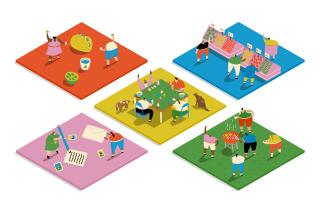Will swine flu tear us apart?
- Share via
When tragedy strikes, people are supposed to band together and find strength in numbers, right? When the well-being of your community is threatened, it’s important to look out for your neighbors and lend a hand to those in need, no?
Well, that’s what many of us may have thought before all the hysteria about the looming swine flu pandemic.
Last week, as public health officials braced for what they thought was the worst, they were on the verge of prescribing something that may seem counterintuitive to the bleeding hearts among us: If you want to stay alive, stay the heck away from other people.
Maybe I’m too sensitive, but every time I get the sniffles, I invariably wind up feeling insulted by someone telling me not to get too close to them. I mean, I’m feeling lousy and the first thing they tell me is “stay away”? Don’t get me wrong. I’m all for self-preservation (and I know, I know -- if I’m sick, I should do everyone a favor and go home). But I promise not to sneeze on you, and you could at least feign concern for my well-being. I mean, what if I had swine flu or something?
With all this in mind, I frankly found it rather tacky that Argentina, Cuba and Peru banned all flights to and from Mexico as swine flu spread last week. How do you say, “A friend in need is a friend indeed,” in Spanish?
After all the preaching and haranguing we receive daily to care for our fellow man -- from religious figures, politicians, do-gooders of all stripes and, of course, our mothers -- it seems a shame that we’d be spreading the message that turning away from everyone else is our key to survival.
And, at least at the broadest level, it just wasn’t true. At the same time that the president was explaining how the “horse was out of the barn,” we were also told by the experts at the World Health Organization that closing borders not only wouldn’t stop H1N1, it could cause economic collapse and possibly add to the flu death rate. That’s because during a pandemic, we need stuff we can only get from trading partners around the world.
Of course, one way to avoid a virus is to stay away from wherever people congregate. When Vice President Joe Biden suggested staying off commercial airlines and even subways, his aides scrambled to protect the travel industry and tone that down after the fact. I know someone who’s avoiding the elevator in her student-filled apartment building downtown, and if more people start to get sick, we could be advised to stay six feet away from one another in public. According to news stories, health officials in every state have submitted emergency plans to the Centers for Disease Control and Prevention. They all contain some form of what is politely called “social distancing strategies.”
In Mexico City, the plans are already in effect: The Zocalo is empty, the schools and churches and movie theaters are closed, and Mexicans have been admonished to stop kissing each other on the cheeks when they greet.
That’s all well and good in the short run. But my fear is that long after this flu is forgotten, millions of Mexicans will still not resort to that rather lovely way of saying hello. This could be the cultural moment that turns our touchy-feely southern neighbors into chillier types who hail from northern latitudes.
But it’s not just about social niceties. The distrust in others that such crises breed can influence cultures in the long term.
A decade ago, in a misguided adventure, I hopped on a ship in Cape Town, South Africa, bound for Tristan da Cunha, which has a claim on being the most remote inhabited island on Earth. When I got to this tiny paradise (population 271) seven long and queasy days later, I was stunned to find myself essentially shunned; the locals wanted nothing to do with me. What a warm welcome!
Isolated as they are in the middle of the Atlantic, these folks, particularly the old people, had little immunity to whatever infections or viruses I might have been carrying. You could see that they’d developed a hearty distrust of outsiders because outsiders literally made them sick.
I’d like to think that every crisis leaves us with some sort of life lesson. After 9/11, I renewed my commitment to only live in cities with no worthy targets for symbol-obsessed terrorists. Hurricane Katrina taught us that not all disasters are responded to equally. Now, with a nod to Jean-Paul Sartre, the swine flu scare has almost convinced me of something I never had the heart to admit: Hell is other people.
More to Read
Sign up for Essential California
The most important California stories and recommendations in your inbox every morning.
You may occasionally receive promotional content from the Los Angeles Times.










